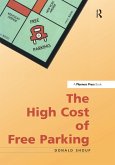Infrastructure, Wellbeing and the Measurement of Happiness (eBook, PDF)
Redaktion: Mahmoudi, Hoda; Seaman, Kate; Roe, Jenny
37,95 €
37,95 €
inkl. MwSt.
Sofort per Download lieferbar

19 °P sammeln
37,95 €
Als Download kaufen

37,95 €
inkl. MwSt.
Sofort per Download lieferbar

19 °P sammeln
Jetzt verschenken
Alle Infos zum eBook verschenken
37,95 €
inkl. MwSt.
Sofort per Download lieferbar
Alle Infos zum eBook verschenken

19 °P sammeln
Infrastructure, Wellbeing and the Measurement of Happiness (eBook, PDF)
Redaktion: Mahmoudi, Hoda; Seaman, Kate; Roe, Jenny
- Format: PDF
- Merkliste
- Auf die Merkliste
- Bewerten Bewerten
- Teilen
- Produkt teilen
- Produkterinnerung
- Produkterinnerung

Bitte loggen Sie sich zunächst in Ihr Kundenkonto ein oder registrieren Sie sich bei
bücher.de, um das eBook-Abo tolino select nutzen zu können.
Hier können Sie sich einloggen
Hier können Sie sich einloggen
Sie sind bereits eingeloggt. Klicken Sie auf 2. tolino select Abo, um fortzufahren.

Bitte loggen Sie sich zunächst in Ihr Kundenkonto ein oder registrieren Sie sich bei bücher.de, um das eBook-Abo tolino select nutzen zu können.
This book takes an interdisciplinary approach to our understanding of infrastructure, and it's influence on happiness and wellbeing, by examining the concept from economic, human development, architectural, urban planning, psychological, and ethical points of view.
- Geräte: PC
- ohne Kopierschutz
- eBook Hilfe
- Größe: 4.77MB
Andere Kunden interessierten sich auch für
![Property, Planning and Protest: The Contentious Politics of Housing Supply (eBook, PDF) Property, Planning and Protest: The Contentious Politics of Housing Supply (eBook, PDF)]() Quintin BradleyProperty, Planning and Protest: The Contentious Politics of Housing Supply (eBook, PDF)37,95 €
Quintin BradleyProperty, Planning and Protest: The Contentious Politics of Housing Supply (eBook, PDF)37,95 €![Public Space (eBook, PDF) Public Space (eBook, PDF)]() Vikas MehtaPublic Space (eBook, PDF)30,95 €
Vikas MehtaPublic Space (eBook, PDF)30,95 €![High Cost of Free Parking (eBook, PDF) High Cost of Free Parking (eBook, PDF)]() Donald ShoupHigh Cost of Free Parking (eBook, PDF)68,95 €
Donald ShoupHigh Cost of Free Parking (eBook, PDF)68,95 €![Great British Plans (eBook, PDF) Great British Plans (eBook, PDF)]() Ian WrayGreat British Plans (eBook, PDF)52,95 €
Ian WrayGreat British Plans (eBook, PDF)52,95 €![The Street (eBook, PDF) The Street (eBook, PDF)]() Vikas MehtaThe Street (eBook, PDF)65,95 €
Vikas MehtaThe Street (eBook, PDF)65,95 €![Small Change (eBook, PDF) Small Change (eBook, PDF)]() Nabeel HamdiSmall Change (eBook, PDF)40,95 €
Nabeel HamdiSmall Change (eBook, PDF)40,95 €![Environmental Impact Assessment in the United States (eBook, PDF) Environmental Impact Assessment in the United States (eBook, PDF)]() Robert M. SanfordEnvironmental Impact Assessment in the United States (eBook, PDF)35,95 €
Robert M. SanfordEnvironmental Impact Assessment in the United States (eBook, PDF)35,95 €-
-
-
This book takes an interdisciplinary approach to our understanding of infrastructure, and it's influence on happiness and wellbeing, by examining the concept from economic, human development, architectural, urban planning, psychological, and ethical points of view.
Dieser Download kann aus rechtlichen Gründen nur mit Rechnungsadresse in A, B, BG, CY, CZ, D, DK, EW, E, FIN, F, GR, HR, H, IRL, I, LT, L, LR, M, NL, PL, P, R, S, SLO, SK ausgeliefert werden.
Produktdetails
- Produktdetails
- Verlag: Taylor & Francis eBooks
- Seitenzahl: 188
- Erscheinungstermin: 2. Dezember 2022
- Englisch
- ISBN-13: 9781000772661
- Artikelnr.: 65434089
- Verlag: Taylor & Francis eBooks
- Seitenzahl: 188
- Erscheinungstermin: 2. Dezember 2022
- Englisch
- ISBN-13: 9781000772661
- Artikelnr.: 65434089
- Herstellerkennzeichnung Die Herstellerinformationen sind derzeit nicht verfügbar.
Hoda Mahmoudi has held The Bahá'í Chair for World Peace at the University of Maryland, College Park since 2012. As director of this endowed academic program, Professor Mahmoudi collaborates with a wide range of scholars, researchers, and practitioners to advance interdisciplinary analysis and open discourse on global peace. Before joining the University of Maryland faculty, Professor Mahmoudi served as the coordinator of the Research Department at the Bahá'í World Centre in Haifa, Israel. Prior to that, Dr. Mahmoudi was Dean of the College of Arts and Sciences at Northeastern Illinois University, where she was also a faculty member in the Department of Sociology. Professor Mahmoudi is co-editor of Interdisciplinary Perspectives on Human Dignity and Human Rights (Emerald, 2019) and of Children and Globalization; Multidisciplinary Perspectives (Routledge, 2019). Professor Mahmoudi is also co-author of A World Without War (Bahá'í Publishing, 2020), co-editor of The Changing Ethos of Human Rights (Elgar, 2021), and most recently co-editor of Fundamental Challenges to Peace and Security: The Future of Humanity (Palgrave Macmillan, 2022). Jenny Roe is Professor and Director of the Center for Design and Health in the School of Architecture, University of Virginia and Honorary Professor in the Urban Institute, Heriot Watt University, UK. An environmental psychologist and former head of Landscape Architecture for an international architectural practice, she writes and lectures on relationships between the built environment and our health and wellbeing. She has over 15 years' experience in the use of 'restorative environments' to build healthier urban societies and communities including a vital role for urban parks and green space. Her publications include Restorative Cities: Urban Design for Mental Health and Wellbeing (Roe and McCay, 2021) which explores a new way of designing cities, one which places health equity and mental health at the forefront. She also advises various stakeholders on strategies for promoting and implementing healthy and human centered city design. Kate Seaman is Assistant Director of The Bahá'í Chair for World Peace at the University of Maryland. Dr. Seaman previously held positions at the University of Baltimore, the University of Bath and was a Postdoctoral Fellow at the University of East Anglia. Dr. Seaman received her Ph.D. from Lancaster University. She is the author of UN-tied Nations; The UN, Peacekeeping and the development of global security governance (Ashgate, 2014). Dr. Seaman is the co-editor of The Changing Ethos of Human Rights (Elgar, 2021), and co-editor of Fundamental Challenges to Global Peace and Security: The Future of Humanity (Palgrave Macmillan, 2022). Her research has been published in Global Governance and Politics and Governance.
Introduction: Infrastructure, Wellbeing and the Measurement of Happiness
Hoda Mahmoudi
Section One: Measuring Wellbeing
1. Building Happier Cities
Aubrilyn Reeder
2. The Geography of Desperation in America: Labor Force Participation,
Mobility, Place, and Well-being
Carol Graham and Sérgio Pinto
3. Racism and US Urban Planning
June Manning Thomas
Section Two: Happiness, Infrastructure and Development
4. Realization of Human Potential in Urban Contexts: Impediments and
Promoters
Carol Ryff
5. The Renewed Importance of Happiness as a Goal of Development
Rodrigo Márquez Arellano
Section Three: Incorporating Wellbeing and Happiness Metrics in
Infrastructure Design
6. The Urban Nature Happiness Hypothesis
Jenny Roe and Naomi A. Sachs
7. Cultivation: A Model for Responsive, Complex Planning to Rigorously
Implement the Infrastructure of Wellbeing.
Tristan Cleveland and Houssam Elokda
Conclusion: Infrastructure as a Means of Inspiring a New Future
Kate Seaman, Hoda Mahmoudi, and Jenny Roe
Hoda Mahmoudi
Section One: Measuring Wellbeing
1. Building Happier Cities
Aubrilyn Reeder
2. The Geography of Desperation in America: Labor Force Participation,
Mobility, Place, and Well-being
Carol Graham and Sérgio Pinto
3. Racism and US Urban Planning
June Manning Thomas
Section Two: Happiness, Infrastructure and Development
4. Realization of Human Potential in Urban Contexts: Impediments and
Promoters
Carol Ryff
5. The Renewed Importance of Happiness as a Goal of Development
Rodrigo Márquez Arellano
Section Three: Incorporating Wellbeing and Happiness Metrics in
Infrastructure Design
6. The Urban Nature Happiness Hypothesis
Jenny Roe and Naomi A. Sachs
7. Cultivation: A Model for Responsive, Complex Planning to Rigorously
Implement the Infrastructure of Wellbeing.
Tristan Cleveland and Houssam Elokda
Conclusion: Infrastructure as a Means of Inspiring a New Future
Kate Seaman, Hoda Mahmoudi, and Jenny Roe
Introduction: Infrastructure, Wellbeing and the Measurement of Happiness
Hoda Mahmoudi
Section One: Measuring Wellbeing
1. Building Happier Cities
Aubrilyn Reeder
2. The Geography of Desperation in America: Labor Force Participation,
Mobility, Place, and Well-being
Carol Graham and Sérgio Pinto
3. Racism and US Urban Planning
June Manning Thomas
Section Two: Happiness, Infrastructure and Development
4. Realization of Human Potential in Urban Contexts: Impediments and
Promoters
Carol Ryff
5. The Renewed Importance of Happiness as a Goal of Development
Rodrigo Márquez Arellano
Section Three: Incorporating Wellbeing and Happiness Metrics in
Infrastructure Design
6. The Urban Nature Happiness Hypothesis
Jenny Roe and Naomi A. Sachs
7. Cultivation: A Model for Responsive, Complex Planning to Rigorously
Implement the Infrastructure of Wellbeing.
Tristan Cleveland and Houssam Elokda
Conclusion: Infrastructure as a Means of Inspiring a New Future
Kate Seaman, Hoda Mahmoudi, and Jenny Roe
Hoda Mahmoudi
Section One: Measuring Wellbeing
1. Building Happier Cities
Aubrilyn Reeder
2. The Geography of Desperation in America: Labor Force Participation,
Mobility, Place, and Well-being
Carol Graham and Sérgio Pinto
3. Racism and US Urban Planning
June Manning Thomas
Section Two: Happiness, Infrastructure and Development
4. Realization of Human Potential in Urban Contexts: Impediments and
Promoters
Carol Ryff
5. The Renewed Importance of Happiness as a Goal of Development
Rodrigo Márquez Arellano
Section Three: Incorporating Wellbeing and Happiness Metrics in
Infrastructure Design
6. The Urban Nature Happiness Hypothesis
Jenny Roe and Naomi A. Sachs
7. Cultivation: A Model for Responsive, Complex Planning to Rigorously
Implement the Infrastructure of Wellbeing.
Tristan Cleveland and Houssam Elokda
Conclusion: Infrastructure as a Means of Inspiring a New Future
Kate Seaman, Hoda Mahmoudi, and Jenny Roe







